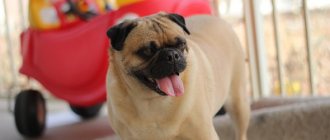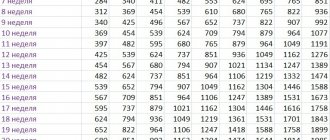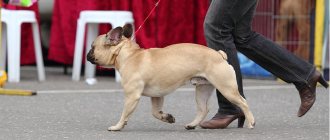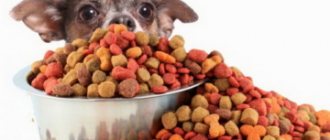The Yorkshire Terrier is one of the most beloved breeds of decorative dogs.
Yorkies' fur is constantly growing hair, but it does not cause allergies. In this regard, even people suffering from allergies to animal fur can keep a terrier at home.
By nature, this is one of the most inquisitive and charming dogs. Also a big plus is the possibility of keeping this dog even in a small apartment .
One of the problems with Yorkie girls is difficult childbirth . Dogs often require medical attention.
Advice! It is worth carefully monitoring all periods of your dog’s pregnancy with a veterinarian. And in case of problems in a dog giving birth, immediately call a doctor.
The number of puppies in a Yorkshire Terrier litter ranges from one to five, sometimes more, depending on the health of the expectant mother and the heredity of the male.
Caring for a Yorkshire Terrier puppy in the first days after birth
Yorkie puppies are born within half an hour of each other . It happens that a terrier giving birth for the first time does not understand what to do, so consult your doctor in advance about how to help the dog.
When born, Yorkshire Terrier puppies are blind, deaf and have no teeth . In addition, they are black . The weight of a newborn Yorkie puppy is approximately 70 to 125 grams .
Important! With their first breath, newborn Yorkies scream loudly; they must breathe through their nose. A few minutes later, he begins to navigate and look for his mother's nipple - this is an innate instinct. If the puppy is weak and breathes through its mouth, then you need to call a veterinarian or a breeder who has experience in giving birth to this breed.
How to care for a Yorkshire Terrier puppy? In the first days, their mother takes care of them . After the mother has licked all the puppies , examine them - their bodies should be elastic.
For several days the babies sleep and eat all the time . They have stool up to 4-5 times a day. Therefore, change diapers often in the playpen where the dog lives with newborns.
Babies should be active, crawl, look for their mother’s nipple, and at this time you don’t have to touch them - just keep an eye on them. She licks and turns them over herself.
Advice ! If puppies are crying and whining, they are probably low on milk or have a stomach ache. If the puppy's belly is swollen, give it to the dog and apply butter to the puppy's anus so that she can lick it and help the baby.
What to feed a Yorkie puppy if
there is not enough milk, then artificial supplementation is introduced .
There are specialized mixtures or you can prepare them yourself - take 400 - 500 ml of milk, one yolk and a tablespoon of dry cream .
The mixture is stirred until the dry matter is completely dissolved, heated to 35° and fed to the babies.
If a tragic situation occurs and the babies are left without a mother, then you need to urgently consult with the breeder or a veterinarian , who will clearly explain the intricacies of caring for newborns. Ideally, you need to find a nursing dog.
If this is not possible, then for the first week, feed with formula milk 12-20 times a day , constantly wipe, turn and almost never leave the baby.
Daily value for different ages
Yorkies are small breeds, so their servings are small. The calculation is based on 1 kg weight of 20 grams of food, this is not a whole tablespoon.
Advice: if the breeder sees that the dog is hungry, then it is allowed to increase it to 25-30 grams.
Depending on age, the daily norm is as follows:
- up to 1 month - mother's milk (on request);
- from 1 to 2 months – 5 meals;
- from 2 to 3 months, also 5 doses, but closer to 3 m, go up to 4 times a day;
- after 3 and up to 6 months - switch to three meals a day;
- from 6 months to a year - three meals a day remain, but starting from 9 months there is a gradual transition to two meals a day.
Recommended reading:
Monge dog food: composition analysis, varieties, price, where to buy?
Note: Some puppies are ready to eat twice a day already at 9-10 months, others take longer to get used to it. However, by 12 months absolutely everyone should eat this way.
What to feed a Yorkshire Terrier puppy in the first 2 months of life
Puppies open their eyes at the age of a week or one and a half, and then they begin to hear. They can lap from the age of 2-3 weeks , at which time additional food can be introduced , since the mother’s milk may not be enough, and the puppies grow very quickly.
To do this, milk porridge first introduced into the terriers' diet .
When the pet is one month old, they begin to give : lean, finely chopped beef or chicken, eggs, cottage cheese, kefir, boiled vegetables (carrots, beets), water porridge, apples, pumpkin seeds.
At 2 months old, a Yorkie can be given dry food , which must be selected by a veterinarian for this breed, as allergic reactions are possible.
Once the puppies are a month old, you can carefully trim their nails.
Advice! It is also important to maintain the temperature regime (24 - 26 degrees), not to create drafts or heat in the apartment. You need to wipe your Yorkie's eyes with a cotton swab and examine them every morning.
Puppy feeding
Until 2-3 weeks, the puppy should eat exclusively mother's milk. Before 2 weeks, the baby should gain weight of at least 5 g per day, after 3 weeks - at least 10 g. If the puppy’s health and weight gain are normal, then after 3 weeks, complementary foods can be introduced.
This is done gradually so that the pet has time to adapt to the new food. You can try a new product once a day. Start with 10-15 g per day, gradually increasing the portion to 100 g. As your Yorkie gets older, his diet will become more varied.
When the dog begins to see, it is taught to feed from a saucer. The number of feedings per day depends on the age of the puppy. Up to 4 months he is fed 5 times, at 4-9 months - 3 times.
Puppy diet
The puppy's first food is goat's or cow's milk. It should be warm. Give 1 teaspoon at first. If there is no negative reaction from the body, the portion is increased 2-3 times. Dogs need milk as a source of calcium - a building material for the skeletal system. But after 4 months it is better to exclude milk. Older Yorkshire Terriers do not digest it well. As the first additive, it is better to take low-fat cottage cheese, then milk porridge.
At 3.5 weeks, meat can be introduced. It can be boiled beef and chicken. Before feeding, grind the meat into mince. After a couple of weeks, meat can be given to the puppy up to 3 times a day. Gradually, the dog is offered low-fat broth, puree soups, and rice water. Instead of minced meat, the meat can be cut into small pieces.
At 2-4 months, puppies undergo intensive growth. At this stage, food should be sufficiently high in calories and rich in fiber. The diet may include boiled yolk, rice with meat, cottage cheese, kefir, boneless sea fish, fruits. This diet should be maintained until the dog reaches 9 months of age.
Look at the description of the Border Terrier dog breed, and also learn about keeping and raising a dog.
Read about the causes of a strange cough in a dog, as well as methods for treating your pet at this address.
Table of Yorkie weight changes by month
If puppies are fed properly, they should gain weight every day. For the first two weeks we weigh the Yorkies every day, then once every three days.
| Newborn puppy weight (g) | 70 – 80 | 85 – 115 | 120 – 130 | 135 – 155 | |
| 1 month | 1 Week | 105 – 115 | 140 – 185 | 190 – 230 | 150 – 270 |
| 2 week | 140 – 185 | 185 – 200 | 285 – 310 | 350 — 380 | |
| 3 week | 170 – 200 | 225 – 310 | 370 – 400 | 450 – 500 | |
| 4 week | 190 – 230 | 270 – 370 | 450 – 480 | 540 – 600 | |
| 2 month | 5 week | 230 – 255 | 310 – 425 | 480 – 550 | 620 – 680 |
| week 6 | 255 – 310 | 355 – 500 | 560 – 620 | 680 – 760 | |
| week 7 | 285 – 340 | 410 – 550 | 620 – 700 | 750 – 851 | |
| 8 week | 312 — 369 | 450 – 600 | 680 – 760 | 820 – 930 | |
| 3 month | Week 9 | 340 – 425 | 500 – 650 | 730 – 820 | 900 – 990 |
| 10 week | 370 – 450 | 540 – 700 | 800 – 870 | 960 – 1070 | |
| 11 week | 390 – 480 | 590 – 765 | 870 – 960 | 1040 – 1200 | |
| 12 week | 420 – 530 | 620 – 850 | 930 – 1050 | 1160 – 1270 | |
| Week 13 | 450 – 570 | 680 – 900 | 1020 – 1130 | 1240 – 1380 | |
| 4 month | Week 14 | 480 – 620 | 730 – 960 | 1100 – 1250 | 1330 – 1470 |
| Week 15 | 540 – 650 | 800 – 1050 | 1150 – 1300 | 1450 – 1600 | |
| Week 16 | 570 – 710 | 850 – 1100 | 1270 – 1390 | 1530 – 1670 | |
| Week 17 | 600 – 730 | 870 – 1160 | 1300 – 1450 | 1600 – 1750 | |
| 5 month | Week 18 | 620 – 800 | 930 – 1220 | 1350 – 1530 | 1700 – 1850 |
| Week 19 | 650 – 820 | 960 – 1250 | 1400 – 1600 | 1750 – 1900 | |
| Week 20 | 680 – 850 | 990 – 1300 | 1450 – 1650 | 1800 – 2000 | |
| 21 weeks | 700 – 880 | 1000 – 1350 | 1530 – 1700 | 1870 – 2050 | |
| 6 month | Week 22 | 710 — 900 | 1050 — 1400 | 1580 – 1750 | 1930 – 2100 |
| Week 23 | 740 – 930 | 1070 – 1400 | 1600 – 1800 | 1980 – 2200 | |
| Week 24 | 740 — 950 | 1100 – 1450 | 1650 – 1850 | 2000 – 2200 | |
| Week 25 | 760 – 950 | 1100 — 1480 | 1660 – 1870 | 2040 – 2240 | |
| Week 26 | 760 – 970 | 1100 – 1500 | 1700 – 1900 | 2070 – 2300 | |
| 1 year 6 months | 900 — 1200 | 1350 — 1800 | 2040 – 2300 | 2400 – 2800 | |
The numbers given in the tables are approximate and are given as a guide for the owner to understand that the Yorkie puppy is being fed correctly and is not overfed, or worse, is he underweight.
Yorkies grow from 14 to 23 cm , adults weigh from 1.3 kg to 3 kg .
If the animal is larger, then the weight may be greater. The veterinarian will help determine whether the dog is overweight and will tell you how to adjust the diet so that the pet remains cheerful and happy.
Advice! The approximate weight of an adult dog can be calculated by multiplying the weight of a two-month-old puppy by 3.
What to feed
Each age has its own criteria for complementary feeding and the amount of food needed for a puppy.
At 1 month
From this moment on, acquaintance with adult food begins.
It is recommended to start gradually:
- Offer your baby a few pieces of dry food (pre-soaked in water). Note: if the food does not arouse interest, then there is no need to insist; you should try again tomorrow;
- give food before the puppies take the mother's breast;
- When pets began to consume food with pleasure (usually this is observed on the 3rd day after introducing complementary foods), increase the number of feedings.
It is better to give only dry food to Yorkie puppies at 1 month because:
- they are easier to digest;
- have a beneficial effect on digestion;
- contain the required minerals and vitamins.
The main thing is to ensure that the chosen food is suitable for this age category and is not lower than premium.
At 2 - 3 months
It is from the age of 2 months that you need to clearly know what kind of food the dog will be fed in the future - dry or natural. The mixed type is prohibited, and it is also better not to give different dry foods unless absolutely necessary.
If the choice is made towards natural food, then for this age you need:
- meat: beef, rabbit, veal; turkey or chicken;
- fish: cod, hake and other low-fat types;
- kefir;
- low-fat cottage cheese or 5%;
- porridge: millet, buckwheat, rice, oatmeal;
- quail eggs; Note: chicken is possible, but with caution.
- pumpkin, bell pepper, red beets;
- green apple.
Meat is served only raw; it is allowed to make porridge with meat broth. Vitamins are also needed; they are purchased at pet pharmacies as prescribed by a veterinarian.
The main thing is that the puppy receives porridge, meat, vegetables every day, fruit every other day, fish and an egg once a week.
Recommended reading:
Go dog food: types, composition, reviews
Prohibited:
- pork;
- boiled meat (any);
- mutton;
- river or lake fish, sea fish - pollock;
- cow or goat milk;
- any bakery products;
- sweet;
- any sausage;
- cabbage.
Also, you should not treat your dog with food from people’s tables.
Up to 3 months you need to feed especially:
- Finely chop the fish and meat, remove any bones;
- first introduce your pet to the yolk of an egg;
- Grate vegetables and fruits on a fine grater.
Any food is served heated.
If the puppy consumes dry food, then the composition is required:
- meat 50%;
- cereals 25%;
- vegetables and fruits 15%;
- other additives 10%.
In addition, they must be premium, super-premium or luxury class.
4-5 months
In the case when the pet remains on natural food, the list of permitted and prohibited foods is the same as for a 2-3 month old dog.
The weekly list of necessary components for use is only expanding:
- meat every day;
- fish once every 3-4 days;
- egg twice a week. You can start giving chicken;
- fruits and vegetables daily.
Gradually, vegetables and fruits can no longer be grated, but finely cut into cubes.
The requirements for the composition and type of dry food are the same as they were before. There is no need to soak the food before serving; the pet must be able to independently desire such food.
6-12 months
Starting from six months of age, natural nutrition should be as varied as possible.
Recommended:
- alternate types of meat and fish, for example, veal one day, beef the next (the same applies to fish);
- if cottage cheese is used on one day, then kefir is needed on the next;
- you can add boiled beef liver or heart; Note: Sometimes the liver causes indigestion.
- Vegetables and fruits should be offered several types per day.
Variety is necessary to ensure that you get all the vitamins and minerals, and also to prevent your animal from becoming addicted to one thing. By the end of the first year of life, your pet should not be given pureed or finely chopped foods. Food cut into medium-sized cubes will pass.
From 6 months It is already necessary to purchase dry food for puppies from six months of age. In terms of composition, quantity of additives and class of requirements, as for earlier ages.
Yorkshire Terrier puppy care and education
Since the Yorkshire Terrier is an indoor dog , it rarely goes outside. Therefore, the animal will go to the toilet in a tray or on a diaper. The question of training a pet to use a litter tray arises before puppy owners approximately from the moment the baby turns one month old . If the mother is nearby, the puppies will learn from her, and the training process will go smoothly.
If the baby doesn’t want to go to the toilet where you decided to put the diaper, then observe where the pet most often leaves puddles, and that’s where you put the diaper.
Puppies empty their stomachs when they wake up or after eating. Notice this, the dog begins to sniff the floor. Take the puppy and put it in the tray .
If everything went well, praise your pet and give him a treat. This procedure must be performed every day for several weeks, then the dog will learn to go to the litter box without problems.
Or make the puppy’s movement area small, lay a diaper there or place a tray. If your Yorkie goes to the toilet while wearing a diaper, praise and treat.
If not, then plant it there every time, day after day, and success will come!
Advice! If your baby defecates past the tray or in another corner of the room, do not scold him under any circumstances! It is necessary to explain with strict intonation immediately after visiting the toilet that you need to use the litter box.
Starting to raise a Mini Yorkie puppy
Usually babies go to new owners from a breeder at the age of 2-3 months, without having the skills to carry out the owner’s commands. In the first months of a baby’s life without a mother, patience, perseverance and affection are needed in upbringing.
You cannot shout at the animal or raise your hand . You need to affectionately ask to give a paw, sit or lie down, and if the command is successfully completed, reinforce the knowledge with a treat.
Yorkie will quickly understand when he can get a tasty snack and will try. If the child does something wrong, speak in a stern tone, but calm, without aggression.
Important! Learn commands with your pet such as “Ugh!”, “No!”, “Place”, “Nearby” - this is the minimum required for future walks with the dog. Since all dogs love to pick up anything they miss from the asphalt, it is important to teach the puppy these commands.
First vaccinations for Yorkie puppies
Yorkies begin to be vaccinated at the age of 2 months, but it is possible at 2.5 months . This most often occurs when puppies are weaned from their mother and their immune system is not protected by the mother's Yorkie's milk.
Important! The dog is dewormed within 10 to 14 days, so there should be no walks outside. Walking is possible only after the second vaccination.
Vaccination is done only if the dog is healthy. After 3 weeks, a second vaccination is given .
Baby teeth
Yorkie is 4 months old his baby teeth are starting to bother him . They will be replaced by permanent teeth before the age of one . It is at the age of 4 months that you should start monitoring your puppy’s jaw - play a lot so that the teeth loosen faster, examine the jaw daily for swelling and wounds.
Important! If you see that a molar tooth is growing on a baby tooth, then you need to go to the veterinarian.
When puppies are separated from their mother
The most commonly cited age for weaning puppies from their mother is 2 months or 50 days . But if there is not enough milk, then you can wean from 3 weeks .
Advice! You need to focus on the condition of the adult dog and the behavior of the puppies. Their claws are already growing and their teeth are cutting, so it’s worth diluting their feedings with milk. Examine the dog after feedings, massage its nipples, lubricate them with camphor oil if milk stagnation occurs.
How to choose a Yorkshire Terrier puppy Before you take it from a breeder, it is better to go and look at the kids a couple of times. Ask what they eat and how they are cared for. This will allow you to be prepared for the new inhabitant of the apartment and buy everything you need.
Before the baby arrives at the new home, you need to buy: a bed, rubber toys, a nail clipper for a given breed of dog (or for a given weight), ceramic bowls for water and food, towels, special combs (iron with long teeth and a slicker brush), special toothpaste and brush, shampoo. Clothing, a leash and a carrier need to be purchased later, based on the size of the dog.
It’s better to bring a new pet into the house in the morning, walk around the apartment with him, show him everything, talk to him kindly, and feed him. To prevent the baby from experiencing severe stress, you need to take away his toys or a blanket (sheet, rag) with the smell of his mother dog from the housing where he lived for the first months. Your Yorkie will probably sleep a lot, so don't disturb him.
The rest of the time, give your dog maximum attention so that she begins to perceive you as the most important person in her life.
Required Supplements
For proper development and to prevent diseases, puppies need various supplements. They are sold ready-made in pet stores, but it is better to buy them if prescribed by a veterinarian.
Recommended reading:
Eukanuba dog food: composition analysis, varieties, price, where to buy?
In other cases, the list of essential food items is as follows:
- a drop of vegetable oil, it is recommended to mix it with vegetables - it helps digestion;
- A cracker of black bread soaked in kefir saturates with carbohydrates. Give once every 7 days;
- half a clove of garlic every 7-10 days – prevention against worms;
- every other day, honey, but only without additives and at the very tip of a spoon - good for the immune system;
- seaweed - up to 9 months, 0.5 teaspoon, after, one teaspoon weekly. It is rich in vitamins, especially important for the growth of the dog.
It is necessary to accustom puppies to supplements gradually, and if an allergic reaction is noted to something, then such components must be excluded from the diet completely.











